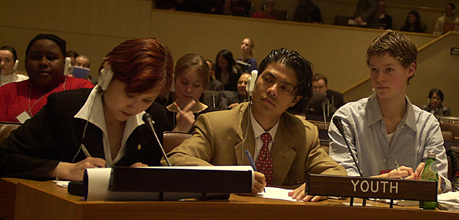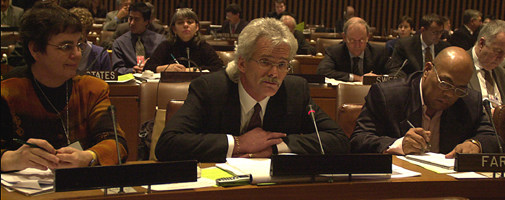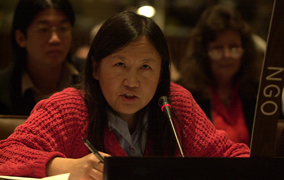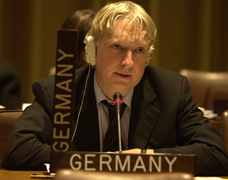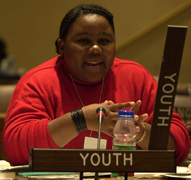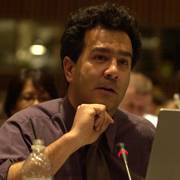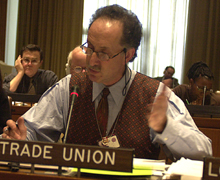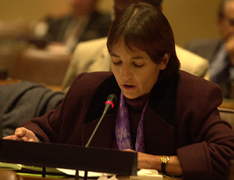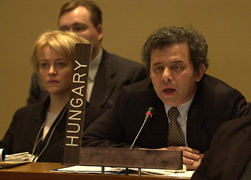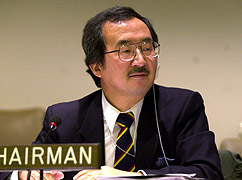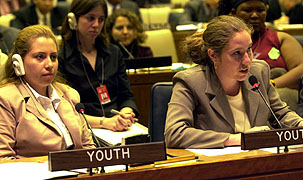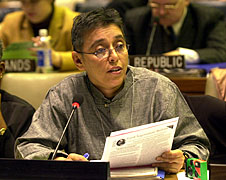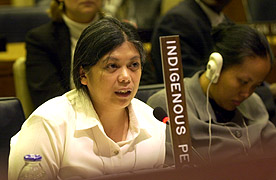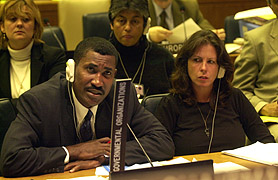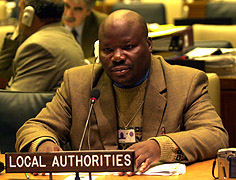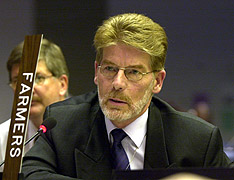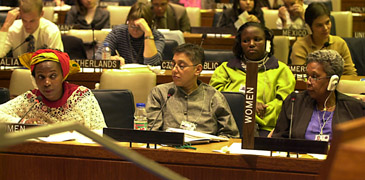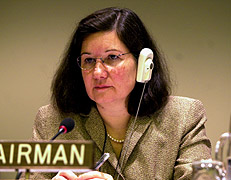|
Multi-Stakeholder
Dialogue Discussion Group I:
Progress achieved in applying integrated approaches to
cross-sectoral objectives
|
|
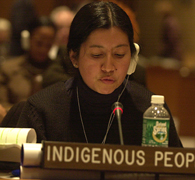  Rocio Velaudia, speaking on behalf of Indigenous Peoples,
emphasized the tradition of sustainable development as a
way of life and a shared vision of resource and environmental
health. They stressed peace, energy availability, climate
change mitigation, and rights, including a commitment to
adopt and implement a rights-based approach, as integral
to successful sustainable development. They added that full
participation by indigenous peoples should be ensured.
Rocio Velaudia, speaking on behalf of Indigenous Peoples,
emphasized the tradition of sustainable development as a
way of life and a shared vision of resource and environmental
health. They stressed peace, energy availability, climate
change mitigation, and rights, including a commitment to
adopt and implement a rights-based approach, as integral
to successful sustainable development. They added that full
participation by indigenous peoples should be ensured. |
| |
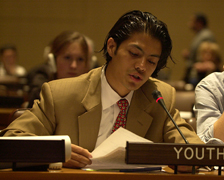  Youth representatives called for governments to engage youth
at all levels of decision-making. They discussed the cross-sectoral
issues of: a decent work agenda of the ILO and a declaration
on fundamental rights at work; employment initiative recommendations
and youth employment policies and programmes; land reform
and tenure; cooperation on policies in education for sustainable
development at all levels; sustainable production and consumption
through awareness campaigns and increased access to landowning;
financing for development to meet agreed ODA targets; and
elimination of corruption in corporations.
Youth representatives called for governments to engage youth
at all levels of decision-making. They discussed the cross-sectoral
issues of: a decent work agenda of the ILO and a declaration
on fundamental rights at work; employment initiative recommendations
and youth employment policies and programmes; land reform
and tenure; cooperation on policies in education for sustainable
development at all levels; sustainable production and consumption
through awareness campaigns and increased access to landowning;
financing for development to meet agreed ODA targets; and
elimination of corruption in corporations. |
| |
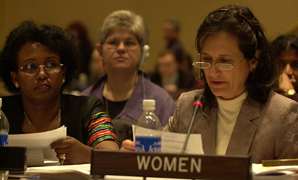
 In preparing for the WSSD, Haddas Wolde Giorgis and Thais
Corall, speaking for women, made the following proposals,
inter alia: mainstreaming gender in all sustainable
development policies and programmes; women's access to and
control over global public goods, specifically land and
water; and regarding the UN, developing more specific and
cross-sectoral gender-disaggregated reporting systems.
In preparing for the WSSD, Haddas Wolde Giorgis and Thais
Corall, speaking for women, made the following proposals,
inter alia: mainstreaming gender in all sustainable
development policies and programmes; women's access to and
control over global public goods, specifically land and
water; and regarding the UN, developing more specific and
cross-sectoral gender-disaggregated reporting systems.
|
| |
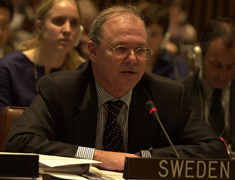  Following
the presentations by major groups, Sweden, inter
alia, supported NGO and youth statements; shared
perspectives of local authorities and applauded Local
Agenda 21 initiatives; and supported gender analysis
to inform planning process. Following
the presentations by major groups, Sweden, inter
alia, supported NGO and youth statements; shared
perspectives of local authorities and applauded Local
Agenda 21 initiatives; and supported gender analysis
to inform planning process.
|
|
|
|
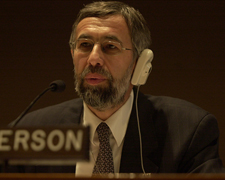
Co-Chair Jan Kára
(Czech Republic)
|
|
|
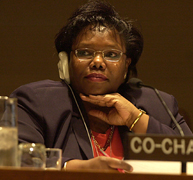
Co-Chair Diane Quarless (Jamaica) |
|
|
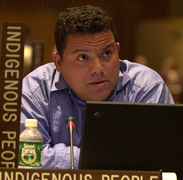 An
indigenous peoples' representative stressed the need to
look at ODA not just in quantity but in quality of projects,
and called for a closer look at the issue of financial
investment in mining, oil and gas and other industries. An
indigenous peoples' representative stressed the need to
look at ODA not just in quantity but in quality of projects,
and called for a closer look at the issue of financial
investment in mining, oil and gas and other industries. |
| |
|
|
|
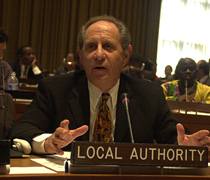  Harvey
Ruvin, Miami Dade Clerk, US, spoke on behalf of local
authorities, noted
progress achieved in over 6,000 communities involved in
Local Agenda 21 programmes, identified sustainable job
creation as key, urged more power and funding for local
governments. They said that the challenge is to focus
on identifying barriers like perverse CO2 subsidies, and
to recognize that sustainable development must include
elimination of poverty through a participatory process
to enable access to food, water and energy. Harvey
Ruvin, Miami Dade Clerk, US, spoke on behalf of local
authorities, noted
progress achieved in over 6,000 communities involved in
Local Agenda 21 programmes, identified sustainable job
creation as key, urged more power and funding for local
governments. They said that the challenge is to focus
on identifying barriers like perverse CO2 subsidies, and
to recognize that sustainable development must include
elimination of poverty through a participatory process
to enable access to food, water and energy.
|
| |
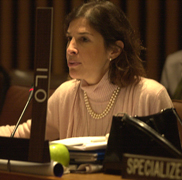  The
ILO stressed social protection measures and capacity
building for workers. She discussed engaging in research
to provide data to workers that then translates into
action for new industries, working with governments
to develop realistic pension schemes and reducing exposure
to hazardous conditions.
The
ILO stressed social protection measures and capacity
building for workers. She discussed engaging in research
to provide data to workers that then translates into
action for new industries, working with governments
to develop realistic pension schemes and reducing exposure
to hazardous conditions.
|
| |
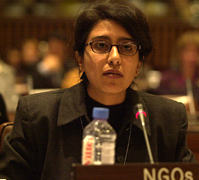
 Anju
Sharna, Center for Science and Environment, speaking on
behalf of NGOs highlighted a number of challenges faced
in achieving sustainable development: governance based on
principles and rights; poverty and impoverishment; finance
and technology; production and consumption patterns; water;
energy; and agriculture.
Anju
Sharna, Center for Science and Environment, speaking on
behalf of NGOs highlighted a number of challenges faced
in achieving sustainable development: governance based on
principles and rights; poverty and impoverishment; finance
and technology; production and consumption patterns; water;
energy; and agriculture. |
| |
|
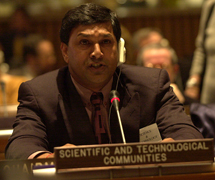 D. Pillay, International Council of Science, and speaking
for the Science and Technology group, prioritized issues
of poverty and inequality, and observed that often low-tech
options for health and sanitation, agriculture, energy
and conflict reduction are successful.
D. Pillay, International Council of Science, and speaking
for the Science and Technology group, prioritized issues
of poverty and inequality, and observed that often low-tech
options for health and sanitation, agriculture, energy
and conflict reduction are successful.
 During
the ensuing debate, representatives said traditional knowledge
has been put on the agenda of the Science and Technology
Community, and urged that sustainable capacity building
for science and technology, as well as for education,
be placed high on the agenda of the Summit.
During
the ensuing debate, representatives said traditional knowledge
has been put on the agenda of the Science and Technology
Community, and urged that sustainable capacity building
for science and technology, as well as for education,
be placed high on the agenda of the Summit.
|
| |
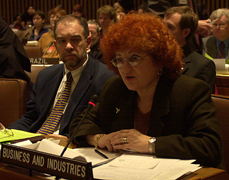 A representative of Business and Industry underscored
pioneering efforts to create management systems to encompass
all aspects of sustainability. She also said five key
areas had contributed to progress in sustainable development:
innovation, investment, infrastructure, integrity, and
involvement.
A representative of Business and Industry underscored
pioneering efforts to create management systems to encompass
all aspects of sustainability. She also said five key
areas had contributed to progress in sustainable development:
innovation, investment, infrastructure, integrity, and
involvement.
 In the ensuing debate, business representatives said,
poverty alleviation should be the number one priority.
The representative stressed the importance of water
and access to fresh water for everyone. He said governments
should always own and control water, but that businesses
could deliver water services, when invited, in partnership
with other groups.
In the ensuing debate, business representatives said,
poverty alleviation should be the number one priority.
The representative stressed the importance of water
and access to fresh water for everyone. He said governments
should always own and control water, but that businesses
could deliver water services, when invited, in partnership
with other groups.
|
| |
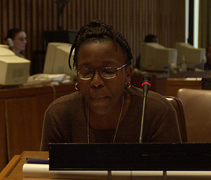  Josephilda Nhlapoltlope of the Congress of South African
Trade Unions, speaking on behalf of trade unions, said
the biggest challenges are unemployment and environmental
degradation, and stressed the necessity of feedback and
monitoring systems and programmes to ensure worker participation.
Josephilda Nhlapoltlope of the Congress of South African
Trade Unions, speaking on behalf of trade unions, said
the biggest challenges are unemployment and environmental
degradation, and stressed the necessity of feedback and
monitoring systems and programmes to ensure worker participation. |
| |
|
 Samoa stressed the importance of the issue of climate
change, and noted the need to downscale models and to
overcome cost barriers and intensify regional efforts.
He agreed with farmers on links of poverty to economic
and social conditions, and stressed the relationship of
oceans and land.
Samoa stressed the importance of the issue of climate
change, and noted the need to downscale models and to
overcome cost barriers and intensify regional efforts.
He agreed with farmers on links of poverty to economic
and social conditions, and stressed the relationship of
oceans and land.
|
| |
 Brazil stressed, inter alia, access to rights, but
lamented that improvements in legal frameworks have not
yet been seen on the ground.
Brazil stressed, inter alia, access to rights, but
lamented that improvements in legal frameworks have not
yet been seen on the ground. |
| |
|
|

